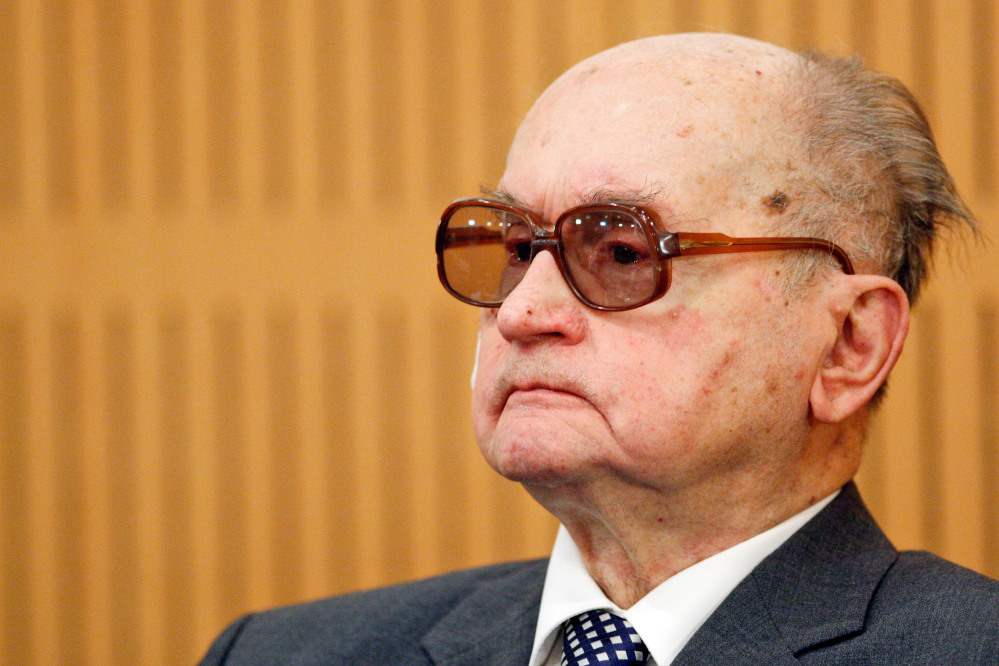Wojciech Jaruzelski, the expressionless Polish general behind dark glasses who imposed martial law in 1981 to crush the independent trade union Solidarity and nearly eight years later participated in the negotiated revolution that led to the fall of communism in Poland, died Sunday at a military hospital in Warsaw. He was 90.
A hospital spokesman announced the death. The general had a stroke this month and had previously been treated for cancer.
Jaruzelski, the scion of landed gentry, was deported to the Soviet Union as a forced laborer in 1941 and returned to Poland later in World War II as a committed communist in the ranks of the Soviet-created Polish First Army.
Starting in the 1950s, he rose rapidly in the military and political establishments of the new People’s Republic of Poland. After the Soviet-backed government’s fall in 1989, Jaruzelski’s past was at the center of post-communist debates about historical reckoning and justice.
MOSCOW’S STOOGE, OR PATRIOT?
Jaruzelski was accused of being Moscow’s stooge, and his political foes repeatedly and unsuccessfully attempted to have him punished for his role in the bloody suppression of protests against the system. He defended himself as a patriot who was forced into the impossible choice of smothering Solidarity himself or watching the Soviet army do it. He said he feared a Soviet invasion would result in carnage; his critics dismissed that as a convenient mirage.
Wojciech Witold Jaruzelski was born July 6, 1923, and grew up on an estate in eastern Poland. Local peasants bowed to the family as they passed in their carriage on the way to Sunday Mass, he recalled.
His aristocratic ancestors were Polish nationalists, and his mother read to him about heroes who struggled, generation after generation, to secure Poland’s independence.
Jaruzelski was educated at a Catholic boarding school and graduated in June 1939, less than three months before Nazi Germany and the Soviet Union carved up his country. The Jaruzelskis fled to Lithuania, where they worked on a farm owned by a Polish family. In 1941, Soviet forces arrested them because of their “socially dangerous” background.
The family was split up, with Wojciech, his mother and younger sister sent to a remote Siberian village near the Mongolian border. His father was sent to a labor camp in another part of Siberia.
The young Jaruzelski cut wood, and the relentless exposure to light reflected off the endless snow damaged his eyes, which was why he later wore his signature tinted glasses.
The family was eventually reunited in the Siberian city of Biysk. His father died of dysentery in 1942.
The future general joined a Polish army organized by Polish communists and sponsored by the Soviet Union. He was sent to an officers’ candidate school in Ryazan, about 90 miles southeast of Moscow.
Jaruzelski crossed the Polish border in 1944, and Polish troops celebrated the moment by singing the national anthem and raising the Polish flag.
The joy was short-lived. Jaruzelski watched the Polish capital burn as the Germans put down the Warsaw Uprising; the underground resistance got no support from Soviet forces just across the Vistula River. After the war, Jaruzelski remained in the military and rose rapidly in an army. At 33, he became the army’s youngest brigadier general. Four years later, he was the army’s political commissar. By 1968, at 45, Jaruzelski became defense minister. One of his first acts was to approve the participation of Polish forces in the invasion of Czechoslovakia that suppressed the reform movement known as the Prague Spring.
SOLIDARITY’S RISE
In August 1980, Anna Walentynowicz, a diminutive dockworker at the Lenin Shipyard in Gdansk, was fired on a trumped-up charge of theft. Workers at the shipyard, led by an electrician named Lech Walesa, went on strike, demanding their colleague’s reinstatement and a pay raise. Solidarity soon had 10 million members and became a parallel authority in Poland. It was inevitable that this new society, would be seen in Moscow as challenging the very foundation of the communist state.
The Kremlin called for “radical steps” to end “anti-Soviet activity” in Poland. In October 1981, as the crisis deepened, Jaruzelski became first secretary of the Polish Communist Party’s Central Committee – effectively, the country’s leader. He weighed the possibility of Soviet intervention, and he chose to send Polish tanks into the streets.
Copy the Story LinkSend questions/comments to the editors.



Success. Please wait for the page to reload. If the page does not reload within 5 seconds, please refresh the page.
Enter your email and password to access comments.
Hi, to comment on stories you must . This profile is in addition to your subscription and website login.
Already have a commenting profile? .
Invalid username/password.
Please check your email to confirm and complete your registration.
Only subscribers are eligible to post comments. Please subscribe or login first for digital access. Here’s why.
Use the form below to reset your password. When you've submitted your account email, we will send an email with a reset code.